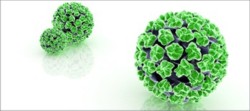Genital Warts, HPV Treathment

What are genital warts?
Genital warts are small, soft lumps in your genital area
that are caused by the human papilloma virus (HPV).
There are more than 100 different types of HPV — these
viruses cause all types of warts including the common warts
seen on the hands, fingers and even the face.
Although only a few members of the HPV family cause genital
warts, these viruses are very common in the community.
How do you get genital warts?
Genital warts are generally transmitted sexually. The wart
virus, HPV, is passed on through having sex or very intimate
contact with someone who already has warts.
HPV can pass through small tears in the skin of your
genitals that happen during sex. A wart will appear in the
same area, usually within 3 months but sometimes not for
years.
People can transmit the virus most easily when warts are
present, but a dormant virus can also be infectious.
Therefore, preventing the spread of genital warts is
extremely difficult. Condoms do not offer 100 per cent
protection against HPV, as they don’t necessarily cover all
of the infected skin.
Diagnosing genital warts
You, your partner or a doctor or midwife may find small,
soft, cauliflower-like, flesh-coloured or white lumps in or
around your vagina, bottom or penis. There can be just one,
or several in a clump.
They can sometimes also grow deep inside your vagina and
rectum where you can’t see or feel them. Your doctor may put
a weak vinegar solution on the lump: it will turn white if
it is a wart.
The doctor may take a small piece of the wart and have it
tested.
Women may also have HPV diagnosed when they have a Pap smear
test.
Symptoms of genital warts
The majority of people with genital warts have no
recognisable symptoms and may not know they are infected.
Others may develop noticeable genital warts of different
sizes.
Some people may experience itching or pain around the
genital area. This pain may be aggravated by intercourse or
contact. In some cases there is bleeding with sex.
What makes genital warts worse?
Being moist and damp.
Using drugs meant for other warts; they’re too strong.
What can help the discomfort of
genital warts?
Some people find the following helpful:
keeping the area clean and dry;
sitting in a salty bath; or
using zinc oxide cream (ask your doctor or chemist).
Treatment of genital warts
Currently, there is no treatment for the virus, but there
are several for the warts; your doctor will help you choose
the best approach for you.
• Freezing: liquid nitrogen is put on the
warts. It will feel very cold, then throb and burn. A
blister will form. Don’t touch or break the blister; it will
heal in a few days. Keep it clean and dry. This treatment is
usually used for large warts.
• Chemical paint: a chemical solution is
painted on the warts. It may be a bit painful or cause a
burning feeling for a few days. This method is used for
small warts. Tell your doctor if you are pregnant: some wart
paints cannot be used at this time.
• Cream: you may be given a cream that you
put on the warts or around your genitals and bottom over
several weeks. It makes the skin peel off, along with the
wart. It is generally not as irritating as the chemical
paints. Cream is useful if there are a lot of warts. There
is also a cream for genital warts that works by improving
the immune system’s response to HPV — this needs to be
prescribed by your doctor, who will instruct you on how to
use it correctly.
• Burning: you will be given an injection
to make that area numb, then the doctor will use a hot wire
or laser to burn off the wart. This treatment is usually
used for large warts.
Follow your doctor’s instructions carefully. You may need
several treatments to get rid of the warts. Bear in mind
that genital warts can come back in the first 2 years after
treatment, especially in the first 3 months. If this happens
you may need to be treated again.
Genital warts and cancer
Some types of HPV infect a woman’s cervix and may increase
the risk of cervical cancer, especially if the virus is
present for many years. Your doctor will therefore suggest
that you have more frequent Pap smear tests than usual if
you have been infected with HPV. If HPV persists, your
doctor will probably recommend a colposcopy, in which your
cervix is examined under magnification and small pieces of
tissue may be removed for further testing (this is called a
biopsy).
HPV has also been linked to cancer of the penis in men.
HPV vaccination
Australian research has led to the development of vaccines
(e.g. Cervarix, Gardasil) that immunise against the HPV
types that are commonly linked to cervical cancer. HPV
vaccination reduces your risk of HPV infection and lessens
the likelihood of cervical changes that can lead to cancer,
especially if you have not previously been exposed to HPV.
However, current vaccines do not protect against all types
of HPV associated with cervical cancer, and you still need
to have Pap smears if you’ve been vaccinated.
Genital warts in pregnancy and
childbirth
Pregnancy can sometimes trigger genital warts if you have a
dormant HPV infection, or it can make an active infection
worse.
Some women with genital warts are concerned about passing
the virus to their baby while giving birth vaginally.
However, this is generally rare. Ask your doctor or obstetrician for
advice if you have genital warts while you are pregnant.
What happens if genital warts
are not treated?
Genital warts clear up by themselves in about a third of
cases — although this can take several years. However,
without treatment, the warts may stay the same or get larger
or more numerous.
When warts are visible, treatment is recommended to reduce
the risk of spreading the infection to others, and many
people also like to have genital warts treated for cosmetic
reasons. .
Can HPV be cured?
Most people with HPV have no signs or symptoms and HPV will
clear up by itself.
Unlike other sexually transmitted infections, HPV is caused
by a virus and viruses cannot be cured with antibiotics.
There is currently no medical cure to eliminate the HPV
virus. Four types of HPV cause the majority of genital warts
(types 6 and 11) and most cases of cervical cancer (types 16
and 18). Two vaccines are now available in Canada; one
protects against types 16 and 18 and the other against all
four types. You should speak to your physician about this
option.
Treatment depends on the type of HPV virus you have
contracted. If you have contracted the low risk types of HPV
that cause genital warts, the warts can be removed with
treatment at home or at your physician's office. If you have
contracted high risk types of HPV that cause cervical, anal
or other genital cancer, the treatment will depend on the
stage of development at the time of diagnosis.
Treatment of HPV related cancer
Once you have been diagnosed with cervical cancer, it means
there is invasive cancer in the deeper layers of the cervix
and has spread to the uterus. If the cancer is limited to
the cervix, it can be treated with the removal of the uterus
(hysterectomy).
If the cancer involves the anus or other genital area, the
cancer can be treated by surgery or radiation therapy.

About HPV Sevices in İstanbul
Op.Dr.Nevra, gynecologist will preform your procedure with optimum intimacy and privacy to provide a comfortable environment for you.
HPV Genital Wart Treatment Parctice İstanbul a boutique office offering personalized treatment in İstanbul
Health and safety are always our top priorities at İstanbul HPV Genital Wart Treatment Office.
Get Started With HPV Consultation / Contact Us..
Get A
Best Consultation » Call Us
(Contact
no 24/7: mobile & Whatsapp +90 5322619315)
